China Memes & Viral
“Soft Drink Prostitution” – How Beverage Bottles on Cars are Used for Soliciting Sex Outside of Chinese Campuses
People looking for paid sex have found a creative way of letting others know. In the world of so-called “soft drink prostitution,” green tea services are cheaper than Red Bull ones.
Published
6 years agoon
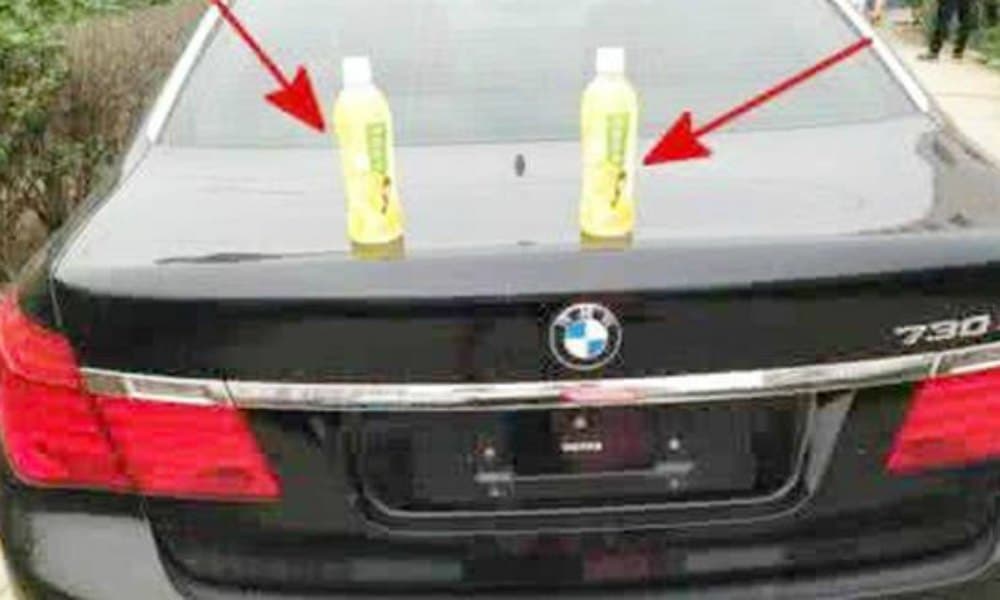
The topic of “soft drink prostitution” has been circulating on Chinese social media over the past few days. It is a phenomenon where parked cars outside of Chinese campuses will have beverages on their rooftops, signaling students that they are willing to pay for sex. Different drinks represent different prices.
Over the past few days, various Chinese media outlets have been reporting about a new phenomenon popping up at Chinese campuses dubbed “soft drink prostitution.”
Just as shoes dangling from trees or telephone wire in many countries are associated with places where people can buy drugs, putting a drink on the roof or hood of a parked car in China (preferably a BMW), would mean the driver is soliciting prostitution.
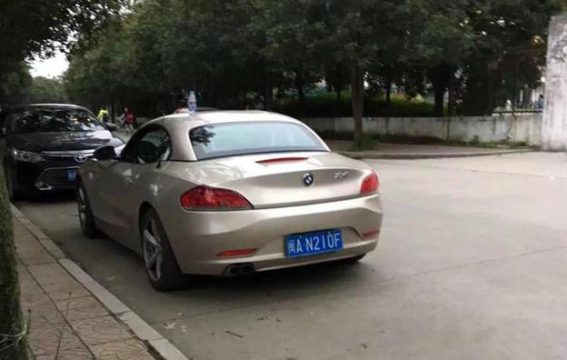
A pet bottle on a car roof means someone is looking for some (paid) action.
Many recent articles about this issue, however, have been taken offline over the past two days from news sites such as Sina.com or Sohu.com.
Is it a new urban myth or is ‘soft drink prostitution’ in fact happening? What’s on Weibo dug deeper to find out more about what this phenomenon entails.
“Different drinks represent different prices.”
The recent coverage of the ‘soft drink prostitution’ phenomenon in Chinese media was first triggered by a notice on the official website of Tianjin Normal University on December 11, 2017, titled: “About the Disposal of ‘Rooftop Beverages’ on Cars From Outside the Campus” (“关于清理校园外来车辆“车顶放置饮料”的情况通报”).

Screenshot of the Dec 11 announcement on the Tianjin Normal University website about parked cars with beverage bottles on them.
The notice explained that since the beginning of the semester, campus security started noticing that parked cars outside the campus gates would have beverage bottles placed on their roofs or hoods with the purpose of “luring in female students to prostitute themselves,” and that “different drinks represent different prices.”

The notice also included a warning that it is illegal for people to perform sexual acts in return for money or goods, regardless of whether such transactions would occur between people of the same sex or opposite sex.
“This does indeed happen in various places.“
Around December 29, 18 days after the original announcement was allegedly placed, news of the Tianjin University phenomenon started spreading on social media in China.
On one message board, netizens questioned the veracity of the announcement, as it was nowhere to be found on the official website of the Tianjin Normal University.
“I’ve attentively examined the website of the Tianjin Normal University,” one commenter wrote: “And this particular news was not on the site. On December 11, they did post two articles, but one was about bank card skimming and the other was about the illegal recruitment of students for training programs. Also, the font used in the screenshot and that used on the official website is not the same.”
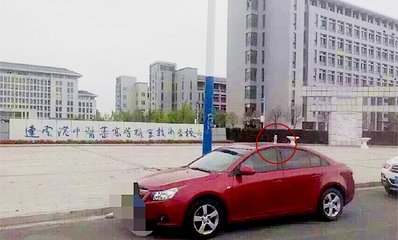
Although the critical readers determined this must be a fake news item, there were others who said that even if it were fake news, “this [practice] does [indeed] happen in various places.”
“It may lead to misunderstandings.“
As rumors about the Chinese campuses “soft drink prostitution” kept circulating online, news sources such as Modern Express (现代快报) and The Paper first covered the issue on January 2, 2018.
According to the The Paper, the announcement was, in fact, true, but that it was taken offline by the University because it “may lead to misunderstandings” because of its “wording.”
On Weibo, some netizens said that the article was more of a “manual” for students to how the phenomenon works than an actual warning against it.
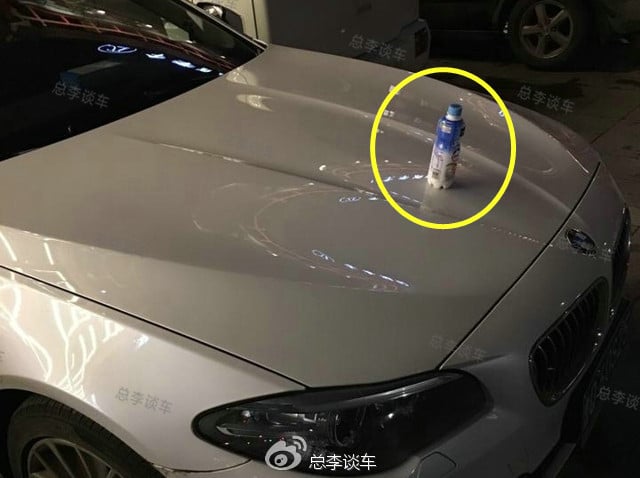
According to a spokesperson at the University, the announcement concerned “a normal procedure,” and was not meant to attract so much attention online.
The spokesperson compared such a warning to regular announcements about pickpockets, and emphasized that no students had entered the parked cars.
“Green tea represents the offer to pay 300 yuan (±45$), whereas a can of Red Bull stands for 600 yuan (±90$).“
So-called “soft drink prostitution” is actually not an entirely new phenomenon around Chinese campuses. Various other media outlets and reporters, such this vlogger called ‘SheCar’on Baidu TV or this online newspaper already reported about the issue in 2016, explaining the difference between drinks types.

A bottle of mineral water means 200 yuan (30$), green tea represents the offer to pay 300 yuan (±45$), for instance, whereas a can of Red Bull stands for 600 yuan (±90$).
During a days-long experiment in which a Baidu TV presenter parked the car outside of various universities in Hunan with a beverage bottle on the rooftop, it turned out that several students -some female and one male- actually did pick up the bottle and got into the car.
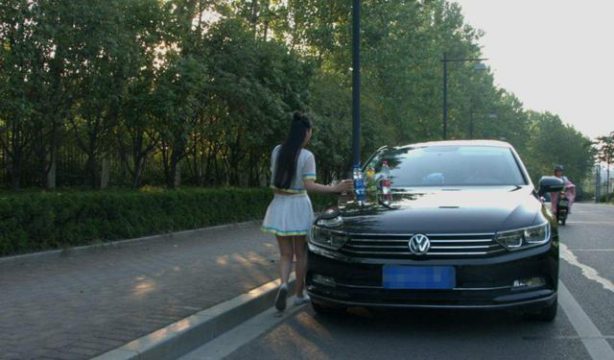
In 2016, Sina news explained that the parked cars outside of campuses are mostly BMW brands. If a person gets into the car that is not to the driver’s liking, they can just say “they are waiting for someone.”
On Weibo, some netizens are surprised that the rumors and alleged “fake news” announcement have turned out to be true: “I always thought this was just some sexual fantasy,” one person comments.
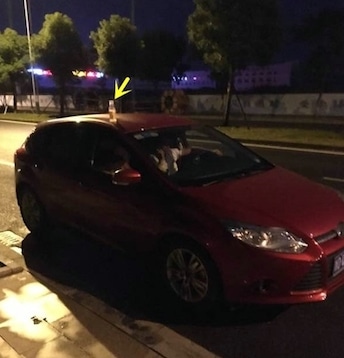
There are also people who say that now that this phenomenon is more widely covered, it actually “reveals what people want to hide” (“此地无银三百两”).
Other people also point out that the beverage bottle trick does not always work. As one commenter writes: “I saw this in front of my school once. But no one got into the car all day. Finally, a street sweeper took the drink from the car roof and drank it.”
By Manya Koetse
Follow @whatsonweibo
Spotted a mistake or want to add something? Please let us know in comments below or email us.
©2018 Whatsonweibo. All rights reserved. Do not reproduce our content without permission – you can contact us at info@whatsonweibo.com.
Manya Koetse is the founder and editor-in-chief of whatsonweibo.com. She is a writer, public speaker, and researcher (Sinologist, MPhil) on social trends, digital developments, and new media in an ever-changing China, with a focus on Chinese society, pop culture, and gender issues. She shares her love for hotpot on hotpotambassador.com. Contact at manya@whatsonweibo.com, or follow on Twitter.

China Memes & Viral
Chengdu Disney: The Quirkiest Hotspot in China
How a senior activity park in Chengdu was ‘Disneyfied’ and became a viral hotspot.
Published
4 days agoon
April 12, 2024
How did a common park turn into a buzzing hotspot? By mixing online trends with real-life fun, blending foreign styles with local charm, and adding a dash of humor and absurdity, Chengdu now boasts its very own ‘Chengdu Disney’. We explain the trend.
– By Manya Koetse, co-authored by Ruixin Zhang
Have you heard about Chengdu Disney yet? If not, it’s probably unlike anything you’d imagine. It’s not actually a Disney theme park opening up in Chengdu, but it’s one of the city’s most viral hotspots these days.
What is now known as ‘Chengdu Disney’ all over the Chinese internet is actually a small outdoor park in a residential area in Chengdu’s Yulin area, which also serves as the local senior fitness activity center.
Crowds of young people are coming to this area to take photos and videos, hang out, sing songs, cosplay, and be part of China’s internet culture in an offline setting.
Once Upon a Rap Talent Show
The roots of ‘Chengdu Disney’ can be traced back to the Chinese hip-hop talent show The Rap of China (中国新说唱), where a performer named Nuomi (诺米), also known as Lodmemo, was eliminated by Chinese rapper Boss Shady (谢帝 Xièdì), one of the judges on the show.
Nuomi felt upset about the elimination and a comment made by his idol mentor, who mistakenly referred to a song Nuomi made for his ‘grandma’ instead of his grandfather. His frustration led to a viral livestream where he expressed his anger towards his participation in The Rap of China and Boss Shady.
However, it wasn’t only his anger that caught attention; it was his exaggerated way of speaking and mannerisms. Nuomi, with his Sichuan accent, repeatedly inserted English phrases like “y’know what I’m saying” and gestured as if throwing punches.
His oversized silver chain, sagging pants, and urban streetwear only reinforce the idea that Nuomi is trying a bit too hard to emulate the fashion style of American rappers from the early 2000s, complete with swagger and street credibility.

Lodmemo emulates the style of American rappers in the early 2000s, and he has made it his brand.
Although people mocked him for his wannabe ‘gangsta’ style, Nuomi embraced the teasing and turned it into an opportunity for fame.
He decided to create a diss track titled Xiè Tiān Xièdì 谢天谢帝, “Thank Heaven, Thank Emperor,” a word joke on Boss Shady’s name, which sounds like “Shady” but literally means ‘Thank the Emperor’ in Chinese. A diss track is a hip hop or rap song intended to mock someone else, usually a fellow musician.
In the song, when Nuomi disses Boss Shady (谢帝 Xièdì), he raps in Sichuan accent: “Xièdì Xièdì wǒ yào diss nǐ [谢帝谢帝我要diss你].” The last two words, namely “diss nǐ” actually means “to diss you” but sounds exactly like the Chinese word for ‘Disney’: Díshìní (迪士尼). This was soon picked up by netizens, who found humor in the similarity; it sounded as if the ‘tough’ rapper Nuomi was singing about wanting to go to Disney.

Nuomi and his diss track, from the music video.
Nuomi filmed the music video for this diss track at a senior activity park in Chengdu’s Yulin subdistrict. The music video went viral in late March, and led to the park being nicknamed the ‘Chengdu Disney.’
The particular exercise machine on which Nuomi performed his rap quickly became an iconic landmark on Douyin, as everyone eagerly sought to visit, sit on the same see-saw-style exercise machine, and repeat the phrase, mimicking the viral video.

What began as a homonym led to people ‘Disneyfying’ the park itself, with crowds of visitors flocking to the park, some dressed in Disney-related costumes.

This further developed the concept of a Chengdu ‘Disney’ destination, turning the park playground into the happiest place in Yulin.
Chengdu: China’s Most Relaxed Hip Hop Hotspot
Chengdu holds a special place in China’s underground hip-hop scene, thanks to its vibrant music culture and the presence of many renowned Chinese hip-hop artists who incorporate the Sichuan dialect into their songs and raps.
This is one reason why this ‘Disney’ meme happened in Chengdu and not in any other Chinese city. But beyond its musical significance, the playful spirit of the meme also aligns with Chengdu’s reputation for being an incredibly laid-back city.
In recent years, the pursuit of a certain “relaxed feeling” (sōngchígǎn 松弛感) has gained popularity across the Chinese internet. Sōngchígǎn is a combination of the word for “relaxed,” “loose” or “lax” (松弛) and the word for “feeling” (感). Initially used to describe a particular female aesthetic, the term evolved to represent a lifestyle where individuals strive to maintain a relaxed demeanor, especially in the face of stressful situations.
🌟 Attention!
For 11 years, What’s on Weibo has remained a 100% independent blog, fueled by my passion to write about China’s digital culture and online trends. Over a year ago, we introduced a soft paywall to ensure the sustainability of this platform. I’m grateful to all our loyal readers who’ve subscribed since 2022. Your support has been invaluable. But we need more subscribers to continue our work. If you appreciate our content and want to support independent China reporting, please consider becoming a subscriber. Your support keeps What’s on Weibo going strong!
The concept gained traction online in mid-2022 when a Weibo user shared a story of a family remaining composed when their travel plans were unexpectedly disrupted due to passport issues. Their calm and collected response inspired the adoption of the “relaxed feeling” term (also read here).
Central to embodying this sense of relaxation is being unfazed by others’ opinions and avoiding unnecessary stress or haste out of fear of judgment.
Nowadays, Chinese cities aim to foster this sense of sōngchígǎn. Not too long ago, there were many hot topics suggesting that Chengdu is the most sōngchí 松弛, the most relaxed city in China.
This sentiment is reflected in the ‘Chengdu Disney’ trend, which both pokes fun at a certain hip-hop aesthetic deemed overly relaxed—like the guys who showed up with sagging pants—and embraces a carefree, childlike silliness that resonates with the city’s character and its people.

Mocking sagging pants at ‘Chengdu Disney.’
Despite the influx of visitors to the Chengdu Disney area, authorities have not yet significantly intervened. Community notices urging respect for nearby residents and the presence of police officers to maintain order indicate a relatively hands-off approach. For now, it seems most people are simply enjoying the relaxed atmosphere.
Being Part of the Meme
An important aspect that contributes to the appeal of Chengdu Disney is its nature as an online meme, allowing people to actively participate in it.

Scenes from Chengdu Disney, images via Weibo.
China has a very strong meme culture. Although there are all kinds of memes, from visual to verbal, many Chinese memes incorporate wordplay. In part, this has to do with the nature of Chinese language, as it offers various opportunities for puns, homophones, and linguistic creativity thanks to its tones and characters.
The use of homophones on Chinese social media is as old as Chinese social media itself. One of the most famous examples is the phrase ‘cǎo ní mǎ’ (草泥马), which literally means ‘grass mud horse’, but is pronounced in the same way as the vulgar “f*ck your mother” (which is written with three different characters).
In the case of the Chengdu Disney trend, it combines a verbal meme—stemming from the ‘diss nǐ’ / Díshìní homophone—and a visual meme, where people gather to pose for videos/photos in the same location, repeating the same phrase.
Moreover, the trend bridges the gap between the online and offline worlds, as people come together at the Chengdu playground, forming a tangible community through digital culture.
The fact that this is happening at a residential exercise park for the elderly adds to the humor: it’s a Chengdu take on what “urban” truly means. These colorful exercise machines are a common sight in Chinese parks nationwide and are actually very mundane. Transforming something so normal into something extraordinary is part of the meme.

A 3D-printed model version of the exercise equipment featured in Nuomi’s music video.
Lastly, the incorporation of the Disney element adds a touch of whimsy to the trend. By introducing characters like Snow White and Mickey Mouse, the trend blends American influences (hip-hop, Disney) with local Chengdu culture, creating a captivating and absurd backdrop for a viral phenomenon.
For some people, the pace in which these trends develop is just too quick. On Weibo, one popular tourism blogger (@吴必虎) wrote: “The viral hotspots are truly unpredictable these days. We’re still seeing buzz around the spicy hot pot in Gansu’s Tianshui, meanwhile, a small seesaw originally meant for the elderly in a residential community suddenly turns into “Chengdu Disneyland,” catching the cultural and tourism authorities of Sichuan and even Shanghai Disneyland off guard. Netizens are truly powerful, even making it difficult for me, as a professional cultural tourism researcher, to keep up with them.”
By Manya Koetse, co-authored by Ruixin Zhang
Independently reporting China trends for over a decade. Like what we do? Support us and get the story behind the hashtag by subscribing:
Spotted a mistake or want to add something? Please let us know in comments below or email us. First-time commenters, please be patient – we will have to manually approve your comment before it appears.
©2024 Whatsonweibo. All rights reserved. Do not reproduce our content without permission – you can contact us at info@whatsonweibo.com.
China Memes & Viral
The Benz Guy from Baoding and the Granny Xu Line-Cutting Controversy
While the public initially supported ‘Grandma Xu’ and criticized the Benz driver from Baoding, the narrative took an unexpected turn.
Published
2 months agoon
February 4, 2024
Following the rapid spread of a video capturing a man and woman involved in a road rage incident, Chinese netizens named and shamed them. But when the situation turned out to be different than it seemed, the focus of the story shifted, emphasizing the responsibility of the so-called ‘melon-eating masses’ actively participating in these kind of hyped-up incidents.
A Baoding license plate with the number 冀F8656Z briefly became China’s most talked-about car tag this week following a road rage incident that was captured on camera (see video). The incident involved the passenger of a black Mercedez-Benz, who went viral on Chinese social media for smashing the hood of another car at a ferry terminal in Zhanjiang. The altercation was triggered by a dispute over line-cutting.
The incident occurred on the afternoon of January 29 at Zhanjiang’s Xuwen Port, where vehicles were queuing up in the car and coach ticket lane. When a Mercedes-Benz Vito attempted to cut into the line, a white Chery car – with an older woman in the passenger seat – refused to yield. In response, the alleged Mercedes owner (male) and another passenger (female) angrily exited their vehicle and scolded the white car’s driver and passenger, as well as slamming their hood and seemingly causing damage to the car.
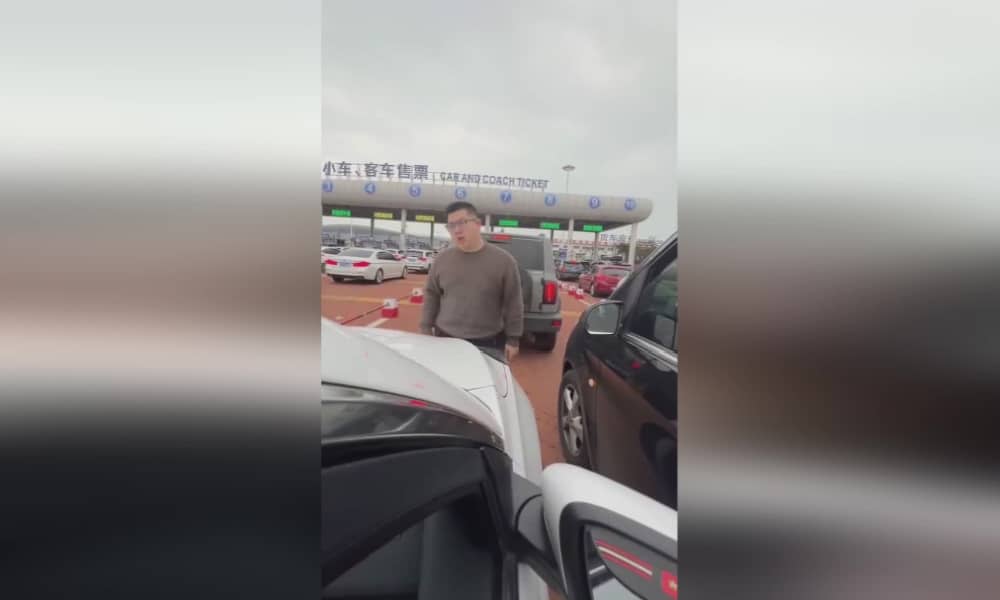
Meanwhile, the black Mercedes, apparently driven by a third individual, proceeded to cut in line and eventually drove off after the passengers got back in.

The 71-year-old lady in the white car who recorded the incident, Ms Xu or Granny Xu (徐老太), just so happened to have a relatively large social media following on a Douyin account run by her daughter (五莲徐八月). When she posted the video of the incident online, her 500,000 followers (now 800,000) came into action to name and shame the couple who insulted and intimidated her. As a result, the license plate, clearly visible in the footage, became a top trending search query.
This phenomenon, wherein netizens unite to research and expose information about individuals involved in controversial incidents, is also known as the “Human Flesh Search Engine” (人肉搜索) in Chinese (read more).
On January 30, the story started gaining massive attention on Chinese social media and online media sites. What mostly angered people was not just the arrogant and aggressive behavior of the Benz passengers, but also the fact that they acted so rude and entitled toward an elderly lady.
It came out that the aggressive man, the 40-year-old Mr. Wang, is a teacher at Hebei Agricultural University, and people started targeting their anger towards the Agricultural University, the city of Baoding, and even Hebei province as a whole.

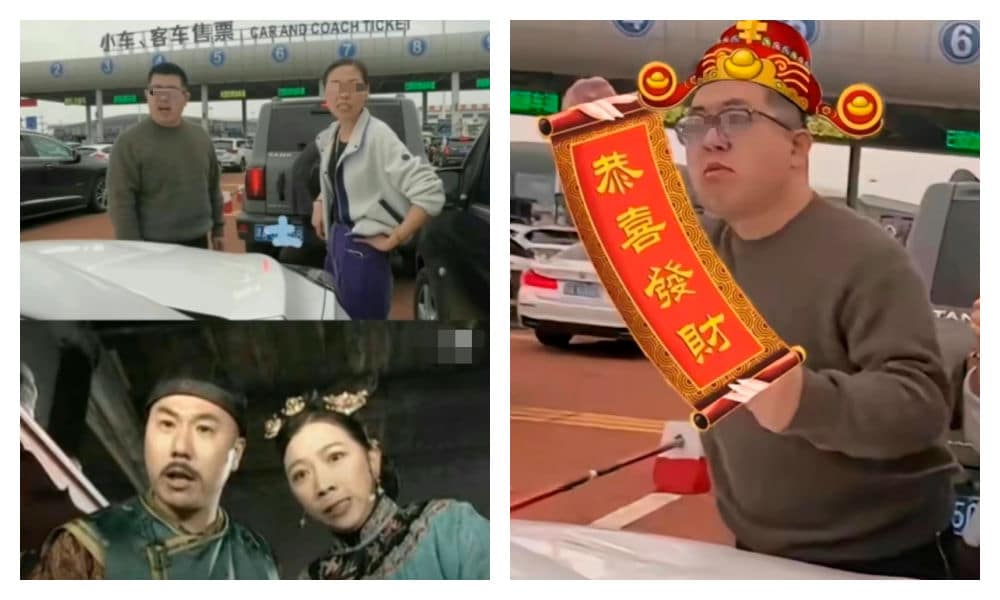
The couple triggered China’s meme machine and popped up in various funny edited images.
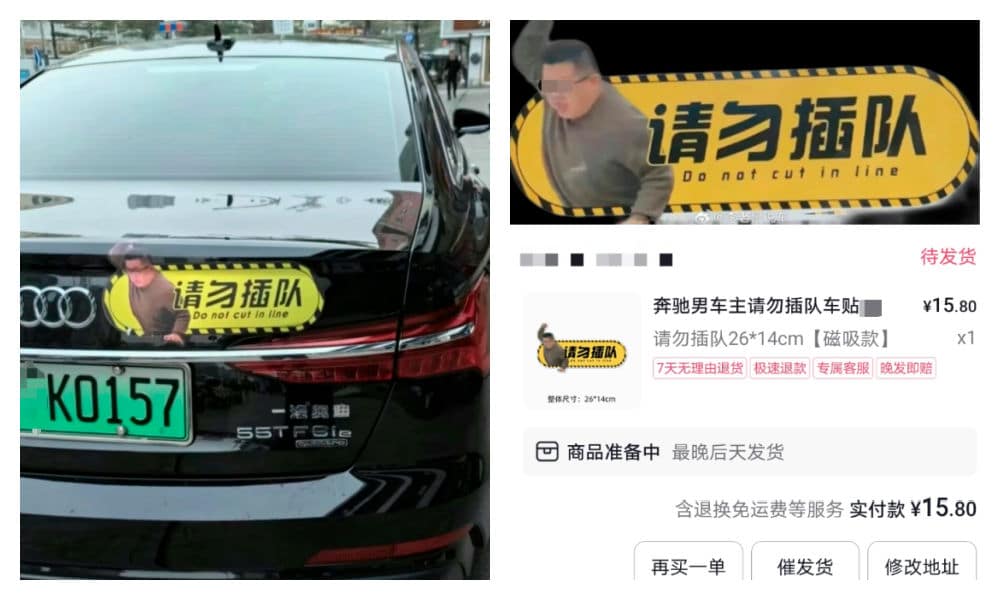
“Do not cut in line” bumper stickers showing the Benz guy from Baoding.
They even appeared on some online merchandise, namely on bumper stickers warning others not to cut in line.
Another Point of View
While the public initially supported ‘Grandma Xu’ and criticized the Benz driver from Baoding, the narrative took an unexpected turn. Because in the midst of this controversy, dashcam footage from the Mercedes Benz also surfaced online, along with other images showing the scene from different angles.

This footage offered an alternative perspective, revealing that the Benz driver was attempting a zipper-style merge into the lane but was intentionally blocked by the white car, with the passenger filming the confrontation.
Later on, the surveillance video from the Xuwen Port was also released (video). That 7-minute video showed the entire conflict from the start, and although it showed that the Mercedes driver was at fault for cutting in line and damaging Xu’s car, it also showed that the Chery car was not without fault.
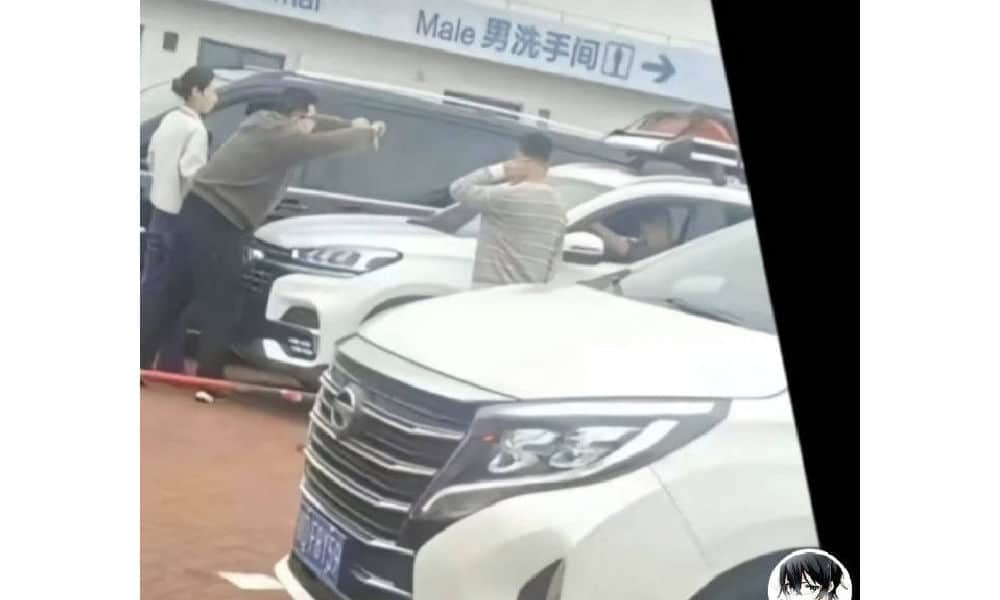
The new information caused a shift in public opinion as people started to think the Ms Xu purposely misrepresented the situation by omitting her role in the traffic altercation. It also became evident that, contrary to initial assumptions, Ms. Xu was not the driver of the white sedan at all; instead, a younger male was behind the wheel.

Bird’s eye view images of Xuwen Port also revealed that in lane 7, where the altercation occurred, all cars eventually merge in a zipper-style pattern.
As a result, both the Benz driver and the elderly lady now faced public condemnation – one for traffic misconduct, the other for distorting the truth on social media.
The Role of the Melon Eaters
As online discussions about the entire incident are still unfolding, there’s been a change in what people focus on regarding this story.
Initially, the rude and agressive Benz guy and his female companion, a meme-worthy couple, were the main topic of conversation. Then, as people started realizing the role played by the so-called ‘granny’ influencer – who edited and posted the footage in such a way that made her seem like the mere victim, – they were angry at her.
Ultimately, however, some commentators and bloggers noted that it is actually the so-called ‘melon eating masses’ who are responsible for making this story go viral and choosing sides without knowing all the facts. The Chinese term is chīguā qúnzhòng (吃瓜群众), translated as melon-eating masses or peanut gallery, referring to the netizens who are enjoying the spectacle as it unfolds, sharing details or opinions with limited knowledge.
While the story is still simmering online, the the Xuwen County Public Security Bureau has imposed a 10-day administrative detention and a fine of 500 yuan ($70) on Mr Wang for his actions of smashing the hood of the car. Ms Xu reportedly is getting her car fixed, renewing the entire hood of the dented sedan.
The original video that sparked all the controversy has since been removed from Ms Xu’s Douyin account.
In the end, the story has a negative impact on both Wang and Xu, which will probably haunt them for some time to come. The only one benefiting is the seller of ‘please don’t cut in line’ bumper stickers, which have since become a viral success.

Regardless of all disagreements regarding this incident, there’s one thing virtually everyone agrees with, especially during this busy Chinese New Year travel season: bad traffic etiquette and cutting in line is not cool, and resorting to aggression and vandalism is never the solution.
By Manya Koetse
Get the story behind the hashtag. Subscribe to What’s on Weibo here to receive our newsletter and get access to our latest articles:
Spotted a mistake or want to add something? Please let us know in comments below or email us. First-time commenters, please be patient – we will have to manually approve your comment before it appears.
©2024 Whatsonweibo. All rights reserved. Do not reproduce our content without permission – you can contact us at info@whatsonweibo.com.
Subscribe

Chengdu Disney: The Quirkiest Hotspot in China

Where to Eat and Drink in Beijing: Yellen’s Picks

Weibo Watch: Burning BMWs

More than Malatang: Tianshui’s Recipe for Success

The Chinese Viral TikTok Song Explained (No, It’s Not About Samsung)

The ‘Two Sessions’ Suggestions: Six Proposals Raising Online Discussions

A Snowball Effect: How Cold Harbin Became the Hottest Place in China

Jia Ling Returns to the Limelight with New “YOLO” Movie and 110-Pound Weight Loss Announcement

Top 9 Chinese Movies to Watch This Spring Festival Holiday

Party Slogan, Weibo Hashtag: “The Next China Will Still Be China”

From Pitch to Politics: About the Messy Messi Affair in Hong Kong (Updated)

Weibo Watch: Frogs in Wells

Looking Back on the 2024 CMG Spring Festival Gala: Highs, Lows, and Noteworthy Moments

Two Years After MU5735 Crash: New Report Finds “Nothing Abnormal” Surrounding Deadly Nose Dive

More than Malatang: Tianshui’s Recipe for Success
Get in touch
Would you like to become a contributor, or do you have any tips or suggestions? Get in touch here!
Popular Reads
-

 China Insight1 month ago
China Insight1 month agoThe ‘Two Sessions’ Suggestions: Six Proposals Raising Online Discussions
-

 China Insight3 months ago
China Insight3 months agoA Snowball Effect: How Cold Harbin Became the Hottest Place in China
-

 China Arts & Entertainment3 months ago
China Arts & Entertainment3 months agoJia Ling Returns to the Limelight with New “YOLO” Movie and 110-Pound Weight Loss Announcement
-

 China Arts & Entertainment2 months ago
China Arts & Entertainment2 months agoTop 9 Chinese Movies to Watch This Spring Festival Holiday





